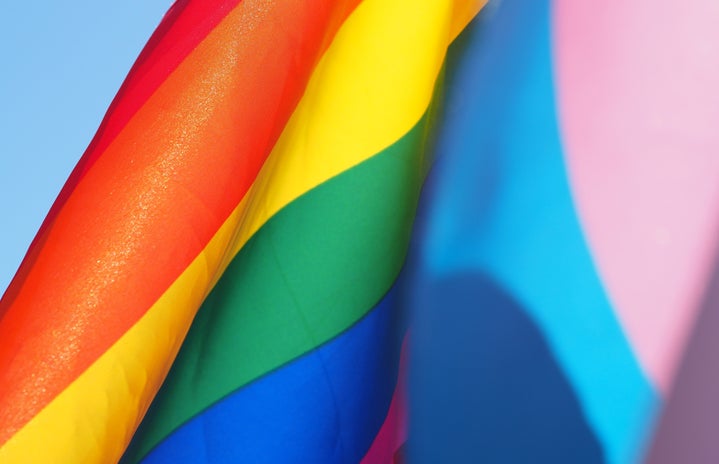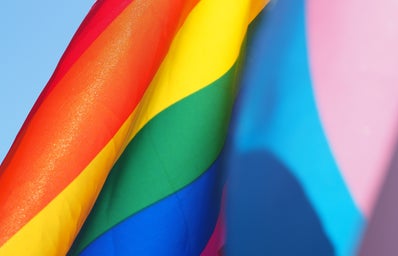When the National Hockey League (NHL) first debuted its “Hockey is For Everyone” campaign in 2013, you could feel an excited buzz among LGBTQ+ hockey fans and players. Finally, the NHL was taking a stand against anti-LGBTQ+ discrimination and attempting to repair their relationship with the LGBTQ+ community after a long history of homophobic incidents. Over the next 10 years, the league slowly built on this success by hosting Pride nights throughout the season and forming different diversity-focused groups within the players association, among other initiatives. It seemed like the league was finally on the right path.
So, after over a decade of support for the LGBTQ+ community both on and off the ice, how did we get to a place where the NHL felt it necessary to ban any use of pride-themed equipment on ice? Why did the NHL make this call two days prior to the 2023-2024 season only to rescind the ban just 19 days later? To answer this, let me take you back to January 2023.
During the 2022-2023 season, all 32 teams in the NHL held a Pride Night. For many teams, this meant donning Pride-themed warm-up jerseys and wearing pride-themed rainbow hockey tape (Pride Tape) on their sticks during the game. In the first half of the season, these nights were celebrated with little controversy, but when it came time for the Philadelphia Flyers to host their Pride night, pushback began. Ivan Provorov, then defenceman for the Flyers, declined to wear the Pride jersey and did not participate in warm-ups, citing religious reasons. Initially, this seemed like an isolated incident, but just 10 days later the New York Rangers chose not to wear themed jerseys on their Pride night despite previously advertising otherwise. Then, over the course of the next three months, more and more players and teams refused to wear the Pride jerseys.
It is important to note that these decisions were nuanced and did not happen in a vacuum. There were many social and political events around the world that directly or indirectly influenced some players’ decisions. Most notably for Russian players, a law was passed in Russia that made it illegal “to promote or ‘praise’ LGBTQ+ relationships, publicly express non-heterosexual orientations or suggest that they are normal.” Across the U.S. there was also a noticeable rise in anti-LGBTQ+ rhetoric, sparking legislative moves like Ron DeSantis’ “Don’t Say Gay” bill. This also isn’t the first time anti-LGBTQ+ sentiment has spread in sports either. Just one year prior in 2022, five members of the Tampa Bay Rays organization removed all Pride decals off their hats and jerseys before their Pride night, also citing religious regions.
The important thing to emphasize though is that all NHL players and organizations had the ability to choose not to participate. The right to choose is incredibly important, especially when it comes to showing your support for causes that you believe in. Apparently, the NHL disagreed with this.
Following the conclusion of the 2022-2023 season, and during Pride month no less, the NHL announced that it was scrapping themed jerseys altogether. During his availability with the press after the announcement, Commissioner of the NHL, Gary Bettman described the Pride jerseys and the players’ refusal to wear them as a “distraction” from what the theme night should really be celebrating. It came across as if the NHL was protecting those who didn’t participate, rather than the marginalized groups that were represented by the Pride jerseys.
This decision garnered a lot of pushback from players and staff across the league, most of whom voiced their displeasure in not being able to support causes they were passionate about on the ice. The NHL’s decision also raised many questions about what was allowed on the ice. Were players still allowed to use Pride Tape or have decals on their helmets during these nights or were they banned too? These questions bring us to the memo that was sent out on Oct. 5, 2023, just two days before the season was set to begin. This memo specified that “players shall not be put in the position of having to demonstrate (or where they may be appearing to demonstrate) personal support for any Special Initiatives.” To put it bluntly, no more Pride tape.
Once again, players across the league spoke out against the ban, acknowledging that no one should be forced to support something they don’t believe in, but not understanding why those who did want to show support were no longer able to do so. While the verbal pushback was nice to see, there wasn’t any significant action taken. That is until Travis Dermott entered the scene.
On Saturday, Oct. 21, 2023, Travis Dermott of the Arizona Coyotes became the first player to openly defy the ban and wear the tape on his stick. Dermott has been an advocate for the LGBTQ+ community in the past, wearing Pride Tape on his stick since his days in junior hockey. While Dermott, isn’t a big name in the league, making just $800,000 on a one-year contract this season, he still felt it necessary to go out with tape on his stick, and defy the ban simply because he felt it was the right thing to do. He knew there was a possibility of getting fined or suspended but did it anyway.
Then he was forced to wait. The league was silent, opting not to make a statement publicly about any possible punishment. It wasn’t until the following Tuesday afternoon that the league announced that “players will now have the option to voluntarily represent social causes with their stick tape” and the ban was effectively rescinded.
So, what now? How does the league recover from such an ill-advised ban that actively harmed a significant portion of their fan base? It’s hard to say. I don’t know if they can recover from it, but at the same time, I’m not entirely sure it will matter. The NHL has swept worse things under the rug, such as the Chicago Blackhawks’ sexual assault scandal, and barely experienced any negative consequences. So, who’s to say it won’t happen again? Hopefully there are more players like Dermott out there who won’t let that happen and will continue to be vocal about social issues that are important to them without fear of the league silencing them.


